| Article ID | Journal | Published Year | Pages | File Type |
|---|---|---|---|---|
| 8749360 | Microbial Pathogenesis | 2018 | 17 Pages |
Abstract
Failure of multi drug resistant tuberculosis (MDR-TB) treatment has increased the risk of aminoglycosides resistance, disease transmission, morbidity and mortality. Aminoglycosides are commonly used in multi drug resistant tuberculosis (MDR-TB) treatment. They inhibit protein synthesis by interacting with translationary steps. Apart from gene mutations various mechanisms of aminoglycosides resistance have been reported but still our knowledge regarding aminoglycosides resistance is fragmentary. Proteomics and bioinformatics approaches are the most accepted approaches to explore the unrevealed mechanisms of aminoglycosides resistance. Our previous studies suggested that over expression of Rv0148 in aminoglycosides resistant M. tuberculosis clinical isolates potentially leads to aminoglycosides resistance. In this study we have analyzed the protein-protein interactions of putative short-chain type dehydrogenase/reductase (Rv0148) and predicted the proteins target linked to the aminoglycosides drug resistance. Interactome predicted that fatty acid synthase (fas), dehydrogenase (htdY), dehydrogenase (MT3642), quinine oxidoreductase (MT0157), phenyloxazoline synthase (mbtB), hypothetical protein (Rv0130), 3-oxoacyl-ACP synthase (kasA), 3-oxoacyl-ACP synthase (kasB) aldehyde dehydrogenase (MT0155) and hypothetical protein (Rv1867) were the interactive partners of Rv0148. We have suggested that Rv0148, its predictive interactive protein partners and their pathways (via lipid metabolism as well as intermediary metabolism and respiration) cumulatively unlock the mystery of aminoglycosides resistance in M. tuberculosis.
Keywords
Related Topics
Life Sciences
Immunology and Microbiology
Microbiology
Authors
Divakar Sharma, Rananjay Singh, Nirmala Deo, Deepa Bisht,
